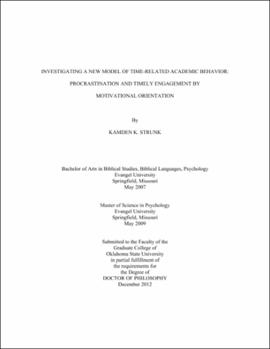| dc.contributor.advisor | Montgomery, Diane | |
| dc.contributor.author | Strunk, Kamden K. | |
| dc.date.accessioned | 2013-11-26T08:31:24Z | |
| dc.date.available | 2013-11-26T08:31:24Z | |
| dc.date.issued | 2012-12 | |
| dc.identifier.uri | https://hdl.handle.net/11244/7148 | |
| dc.description.abstract | Scope and Method of Study: The purpose of this study was to examine the nature of time-related academic behavior (i.e., procrastination and timely engagement) in the academic context. Specifically, this study aimed to build a new model for understanding these behaviors in a motivational framework by using motivational orientation to frame these behaviors. Participants were 1,227 undergraduate students enrolled in face-to-face courses at a large Midwestern university. Each participant completed a series of measures including the 2x2 Measure of Procrastination and Timely Engagement, two subscales of the Motivated Strategies for Learning Questionnaire, the Achievement Goal Questionnaire, a measure of Self-Efficacy for Self-Regulation, the mini-IPIP, and a demographic questionnaire through an online survey, and participants completed the same measures again 15 weeks later. | |
| dc.description.abstract | Findings and Conclusions: Findings include confirmatory factor analyses for all key measures. These indicated the four-factor model for time-related academic behavior was the best-fitting model to the observed data. Further, these raised questions about the existing models of achievement goals. Reliability analyses were also performed in three different models including the traditional tau-equivalent model (Chronbach's alpha), the congeneric model, and the test-retest model. Then, structural equation modeling was conducted to determine how well the variables would predict time-related academic behavior. Then, these models were retested using path analysis on the longitudinal data to determine how well this prediction holds up across time. Finally, cluster analysis was used for a person-centered view of the nature of the relationships among the variables. The findings present the view that self-efficacy for self-regulation may be one of the more important predictors of time-related academic behavior, that time-related academic behaviors seem to be related to the goals one has for the situation, and that personality is not a strong predictor across time, suggesting these behaviors are more malleable to intervention than previously thought. Implications for educational practice, theory, and future research are discussed. | |
| dc.format | application/pdf | |
| dc.language | en_US | |
| dc.rights | Copyright is held by the author who has granted the Oklahoma State University Library the non-exclusive right to share this material in its institutional repository. Contact Digital Library Services at lib-dls@okstate.edu or 405-744-9161 for the permission policy on the use, reproduction or distribution of this material. | |
| dc.title | Investigating a new model of time-related academic behavior: Procrastination and timely engagement by motivational orientation | |
| dc.contributor.committeeMember | Cho, YoonJung | |
| dc.contributor.committeeMember | Harrist, Steve | |
| dc.contributor.committeeMember | Miller, Janice Williams | |
| osu.filename | Strunk_okstate_0664D_12379 | |
| osu.accesstype | Open Access | |
| dc.type.genre | Dissertation | |
| dc.type.material | Text | |
| thesis.degree.discipline | Educational Psychology | |
| thesis.degree.grantor | Oklahoma State University | |
